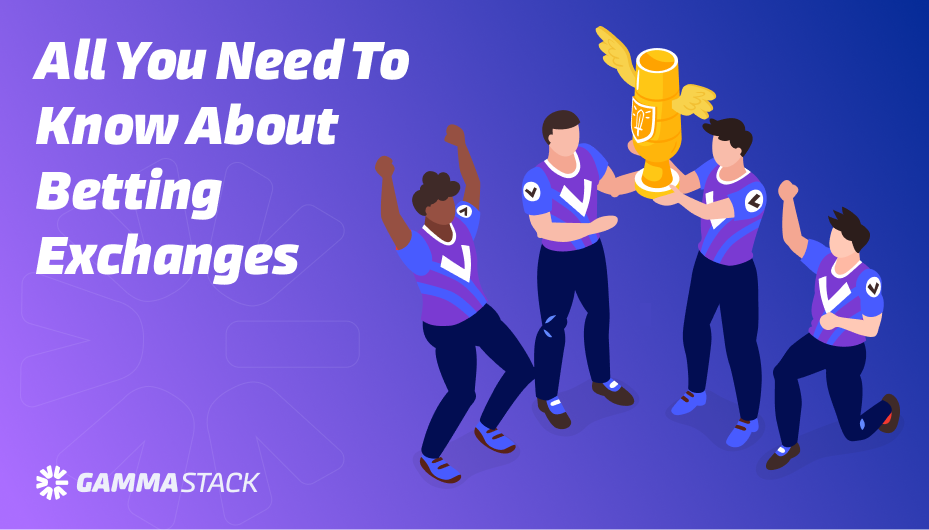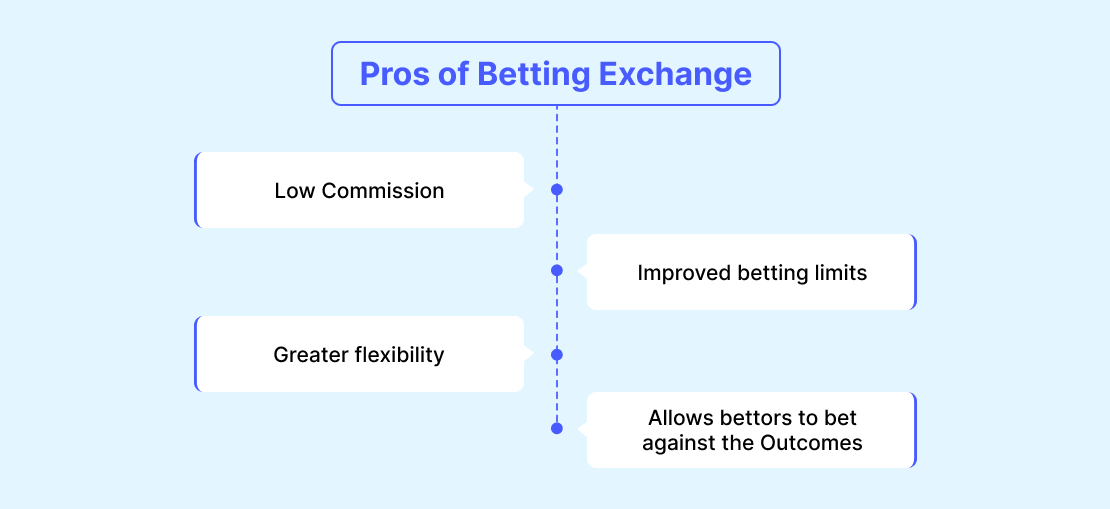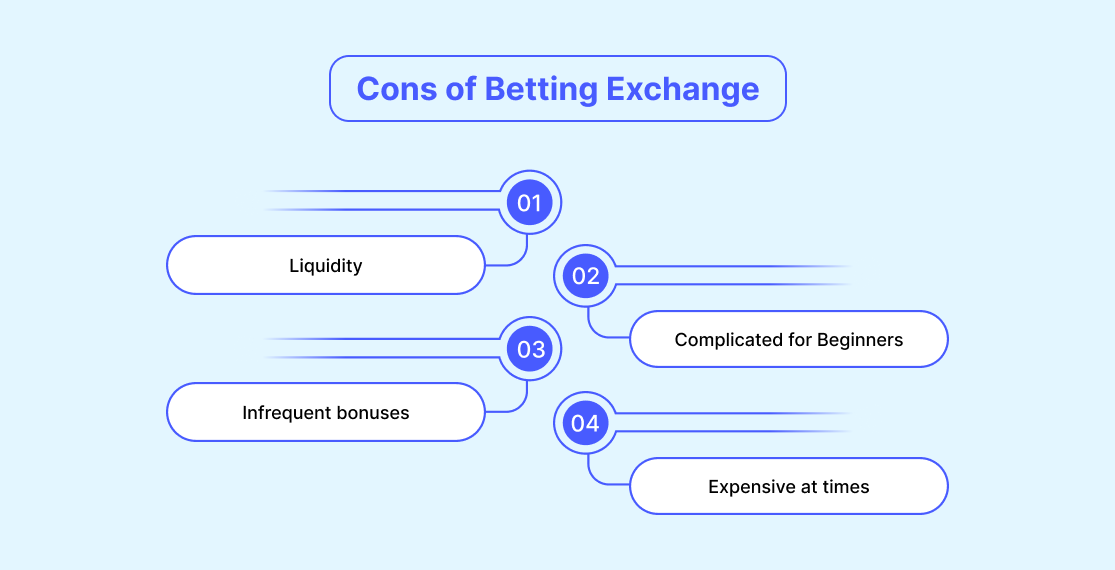

All You Need To Know About Betting Exchanges
Betting exchanges have transformed the sports betting landscape by offering a more flexible and transparent alternative to traditional sportsbooks., These are more flexible, thrilling, and change the way bettors engage with sports betting. If you are someone who has just begun or someone who wants to try something new in this landscape, then this blog is for you.
This blog is a comprehensive betting exchange guide that explores the basics of betting exchanges, their pros and cons, and provides a comparison between sportsbooks and betting exchanges for a deeper understanding.
What is a Betting Exchange?
Features of Betting Exchanges
- Peer-to-peer betting
- No preset or in-built margin or vig
- Open and transparent market dynamics
- Commission-based revenue generation model
Types of bets bettors can place:
- Back Bet: Betting that a specific outcome will happen, for example, a team will win.
- Lay Bet: Betting against a specific outcome, for example, a team will not win.
How does Betting Exchange Work?
- It provides the bettors a platform where they get in a pair and bet against each other on the commonly agreed odds.
- Betting exchanges charge commission on the winning bets.
- Boosts competition by allowing bettors to exchange odds information and have head-to-head competition against one another.
- It involves a backer and a layer. A backer is the one who believes the outcome will happen; a layer believes it won’t and offers odds accordingly.
- In a lay bet, the bettor essentially acts like the bookmaker, offering odds and accepting someone else’s back bet, where he only decides the price and proposes the odds.
- A backer is in a position where he finds the bet can accept or reject the bet, choose the amount they want to stake and confirm it.
Pros of Betting Exchange


Low Commission
Betting exchanges charge a small commission on winnings, but bettors often benefit from better odds since there’s no bookmaker margin.

Improved betting limits
Betting exchanges typically don’t limit stakes based on betting success, unlike some traditional sportsbooks, though maximum bets may still depend on market liquidity. They also support high betting limits because they don’t pay attention to who wins and who doesn’t, leaving them no worry on the risk management part.

Greater flexibility
Betting exchanges are highly flexible because they allow bettors to set their own odds, allowing them to use a lay betting strategy or back the outcome of the event.

Allows bettors to bet against the Outcomes
Betting exchanges allow two-way betting by enabling users to both back and lay outcomes, allowing bettors to place bets in favour or against the outcome of the event or game.
Want to learn more about Betting Exchanges?
Cons of Betting Exchange


Liquidity
Betting exchange markets rely on having participants on both sides (backers and layers), and low market liquidity can make it hard to find matched bets and have chances to make bettors struggle to find reasonable odds, if the market lacks liquidity.

Complicated for Beginners
Betting exchange can be a bit challenging for inexperienced bettors; hence, they should either start with the traditional sportsbook or back the bets to get to know how it works.

Infrequent bonuses
As the betting exchange business is a low-margin business, and often charges less commission hence, they do not frequently offer bonuses to the bettors.

Expensive at times
Betting exchanges are considered to be more affordable than sportsbooks; however, not always. Sometimes the exchanges charge a high percentage of commissions too on winning bets, making the bets expensive.
Explore Blogs From Other Categories
Betting Exchange vs Traditional Bookmakers: What’s the difference?

Betting Flexibility
A betting exchange allows bettors to bet on both sides of the market because they get to “back” and “lay” the outcome of the game. However, a bookmaker can only back it up because the odds are already provided by the sportsbook.

Profitability
Bettors only gain access to the odds the bookmakers offer, after including their vig or margin on each bet, reducing the bettor’s chances of gaining profitability. However, a betting exchange offers better odds and has higher chances for a bettor to be profitable.

Betting Limit
A betting exchange has no limit as the amount a bettor bets is determined by liquidity and unlike some sportsbooks that limit stakes based on betting history or risk profiles.

Commission
Betting exchanges charge commission for facilitating peer-to-peer betting, which is generally low, saving them a lot, unlike bookmakers’ practice of setting vig on each bet.
Want to Get a Quote on Your Preferred Sports Betting Software?
How GammaStack Can Help You Launch Your Betting Exchange Software?
Gammastack is a leading betting exchange software provider with 14+ years of expertise in the iGaming industry. We provide you with a robust betting exchange solution that’s wrapped with advanced features such as cryptocurrency support, PAM modules, multilingual and multicurrency support, robust admin back office, ongoing maintenance and more. Get your sports betting exchange platform developed from scratch with complete adherence to regulatory frameworks and certifications in the betting exchange markets.
Frequently Asked Questions(FAQs)
Some of the most reliable online betting exchanges include:
- Betfair
- Matchbook
- Smarkets
- Betdaq
These platforms are known for their wide range of sports markets and competitive odds.
Betting exchanges generally support a wide range of sports, including major markets such as:
- Football
- Cricket
- Basketball
- Horse Racing
- Tennis
In addition to these, you can often find niche markets, esports, and live in-play betting options.
Here are a few essential tips for gaining profits on betting exchanges:
- Choose a familiar sport: Stick to sports you understand, especially as a beginner.
- Check commission charges: Different exchanges charge different fees, so compare before placing bets.
- Track price movements: Watch how odds change over time to find value opportunities.
- Use advanced strategies: Techniques like hedging, trading on odds movement, and profit locking can improve returns.
Betting exchanges are gaining popularity due to their user-friendly features and better value for bettors. Key reasons include:
- No bookmaker margins and more competitive odds.
- Full control for bettors to set their own odds and stakes.
- High transparency, as users can see available liquidity before betting.
- In-play opportunities, allowing you to bet on live events with changing odds.

